Thronmax Space wireless mic kit review: an almost-great option for vloggers & more
The Thronmax Space wireless mic kit includes a useful and well-designed pack of condenser and lavalier mics and accessories that drops the ball with no included support for Apple mobile devices.
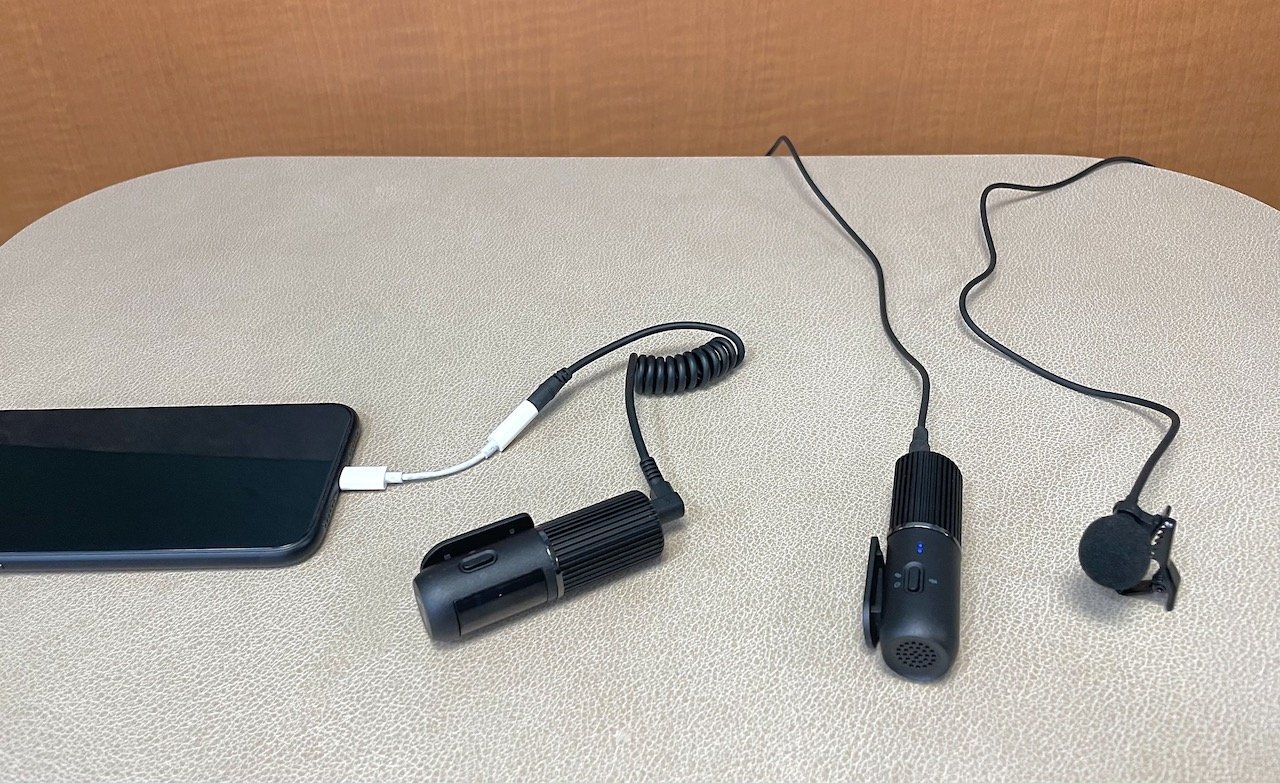
Thronmax has been making USB microphones for quite a while, but mostly the sort you might use for video-conferencing or podcasting when you need an upgrade from built-in mics. Their forthcoming Space mic set adds to their desktop line by expanding into wearable wireless mics.
This package is a great option for photographers, filmmakers, interview shows, or anywhere you need a wireless microphone. The kit comes in a "presentation" metal box with some faux leather on the top.
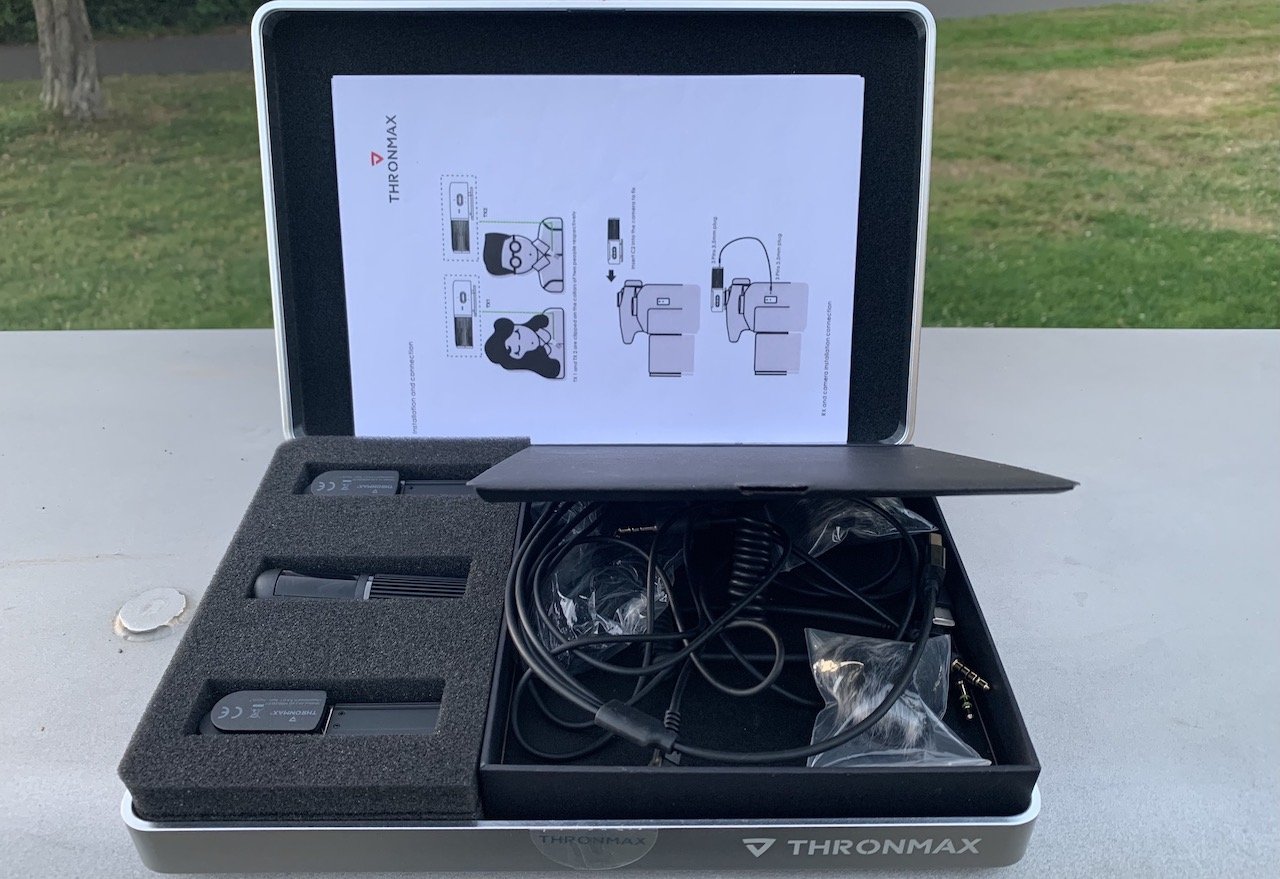
The presentation box
This nice touch makes it useful as a tray for easy access to the other items or as a soft top to rest delicate equipment, like a DSLR. The kit includes:
- Two condenser microphones that double as wireless transmitters
- Two lavalier mics with TRS cords that attach to the transmitters
- A receiver module designed to look a lot like the transmitters
- A vastly smaller zippered carrying case that everything can squeeze into for portability
- Two windscreen filters for outdoor work
- A TRS-to-TRRS adapter cord (compatible with Apple headphone jacks)
- A TRRS-to-USB-C cord (Android-only, according to Thronmax)
- A USB-A to USB-C tri-head cable (for charging the mics and receiver)
- A two-page "manual" that explains what each piece is and some of its controls
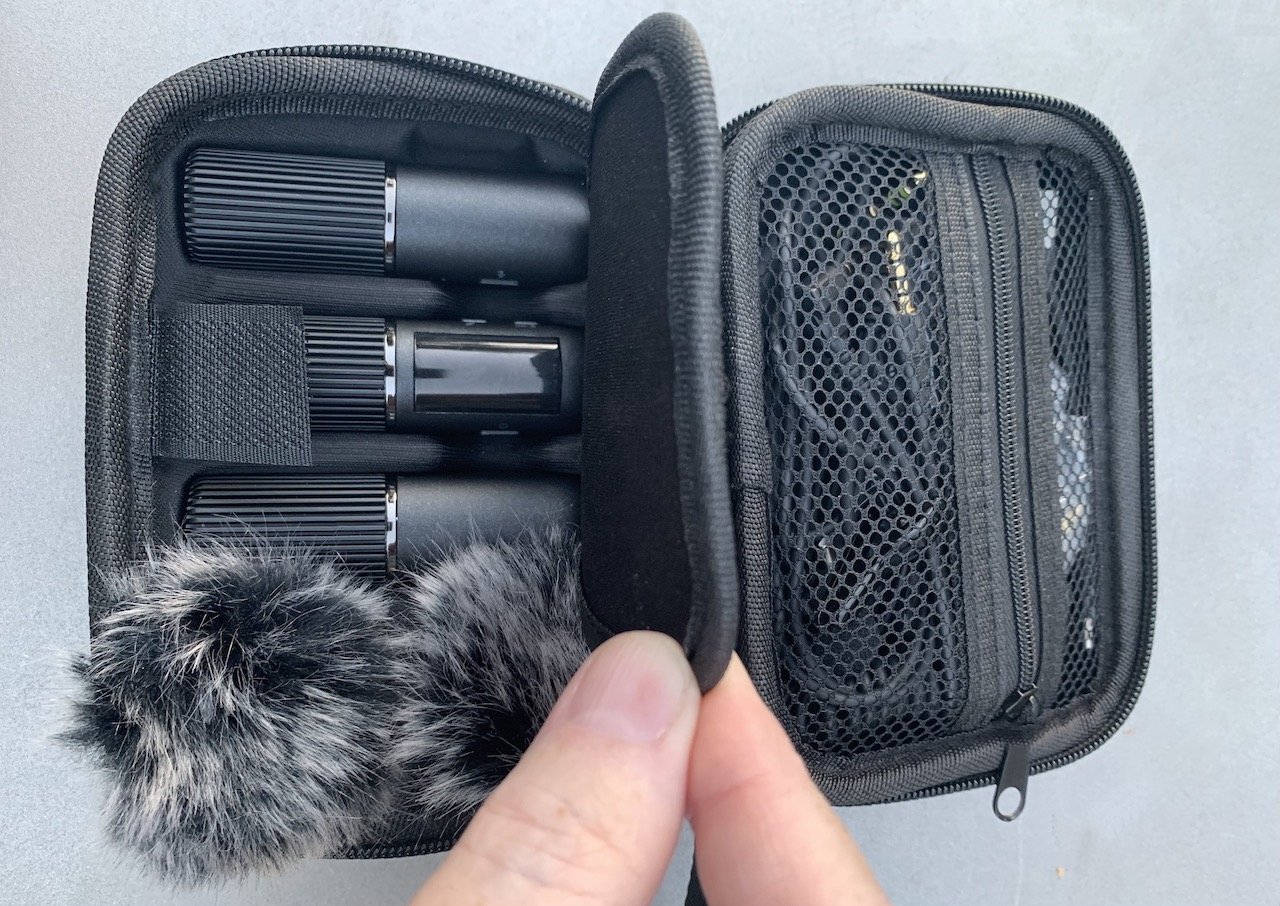
The more compact travel version with the same contents
It's what this kit forgets to include that makes it frustrating for Apple users. To record these mics flowing into an iPhone or iPad, you must buy a TRRS adapter to Lightning and a TRRS adapter to USB-C.
If your Mac includes a headphone jack, you can use the included TRS-to-TRRS cord without issue. But the point of this kit is to record almost anywhere, so having no included way to record directly to an iPhone or iPad is a major shortcoming.
Thankfully, Apple sells TRRS adapters as 3.5mm headphone adapters for Lightning or USB-C for a mere $9 each. They work as mic and headphone adapters because they work with the built-in mic on EarPods.
To briefly explain TRS and TRRS for those unfamiliar: if you look at the plug end of a 3.5mm headphone or microphone, you'll see a metal sleeve topped by a shaped tip and some black markings along the sleeve. The bit of the metal sleeve between the markings is called a "ring."
A 3.5mm wired headphone that does not have a mic built-in will have one ring and is known as TRS, or Tip-Ring-Sleeve. The "ring" area is usually used for right-channel sound, and the tip is used for the left channel.
When a wired headphone does include a mic, you'll see three black markings, designating two "rings." This is a TRRS or Tip-Ring-Ring-Sleeve mic, where the tip is used for the left channel, the first ring is used for the right channel, and the lower ring is for grounding.
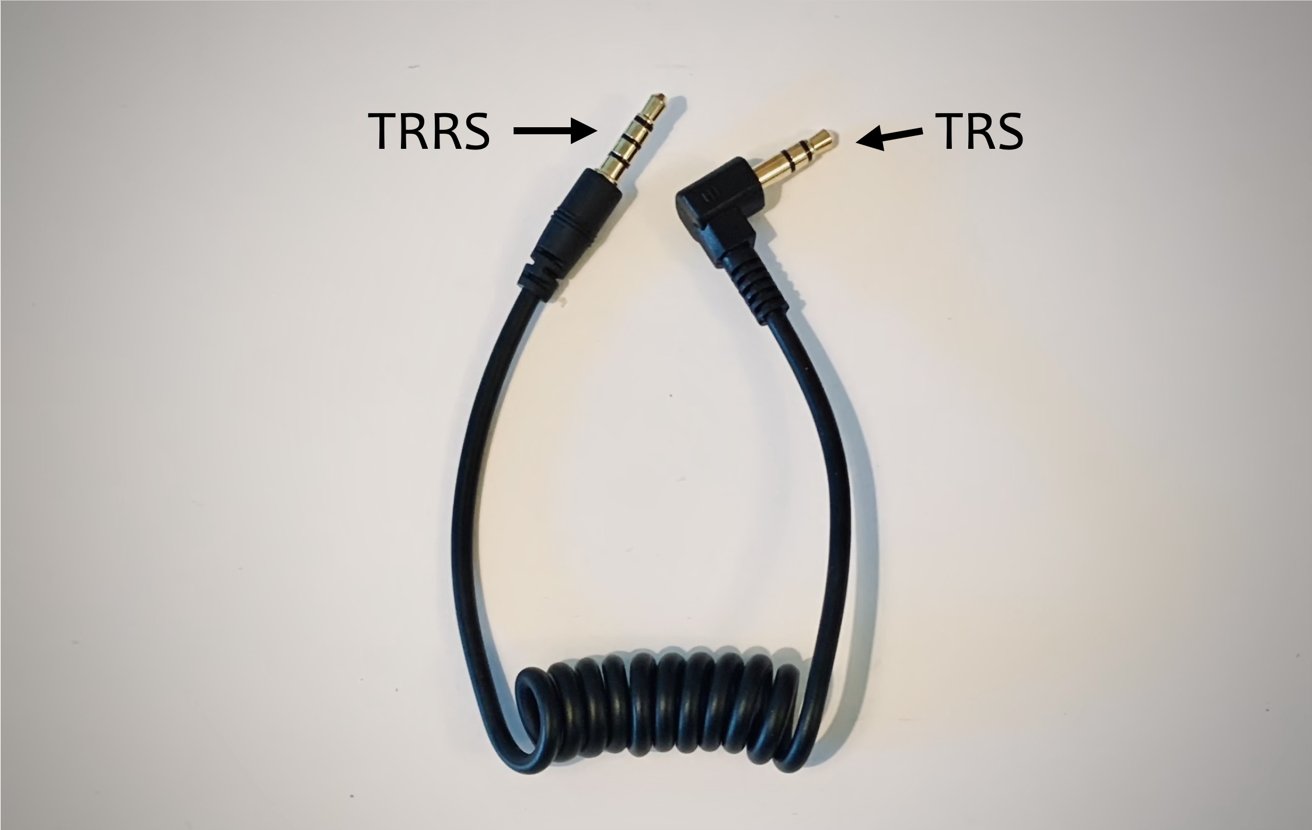
The TRRS plug goes into your adapter or headphone jack for Apple devices.
The wireless transmitters in the Thronmax Space kit are a brilliant bit of design work. Instead of just being transmitters, they double as small-capsule condenser microphones.
They feature a nice, compact, and rounded "barrel" design that will blend right in if you're wearing black or dark grey. You can use the included lavaliers if they're too bulky for your needs.
The lavalier mics plug into the transmitter and turn off the condenser mic. Being smaller mics, the lavaliers lose some sound quality but, like the condensers, can be combined into a stereo pair if desired.
The mic/transmitters and the receiver module feature a clip that works well with the vest, shirt collar, or jacket thickness. The clip also slides right into a camera's hot shoe for easy recording if you're using a DSLR, as most YouTubers do.
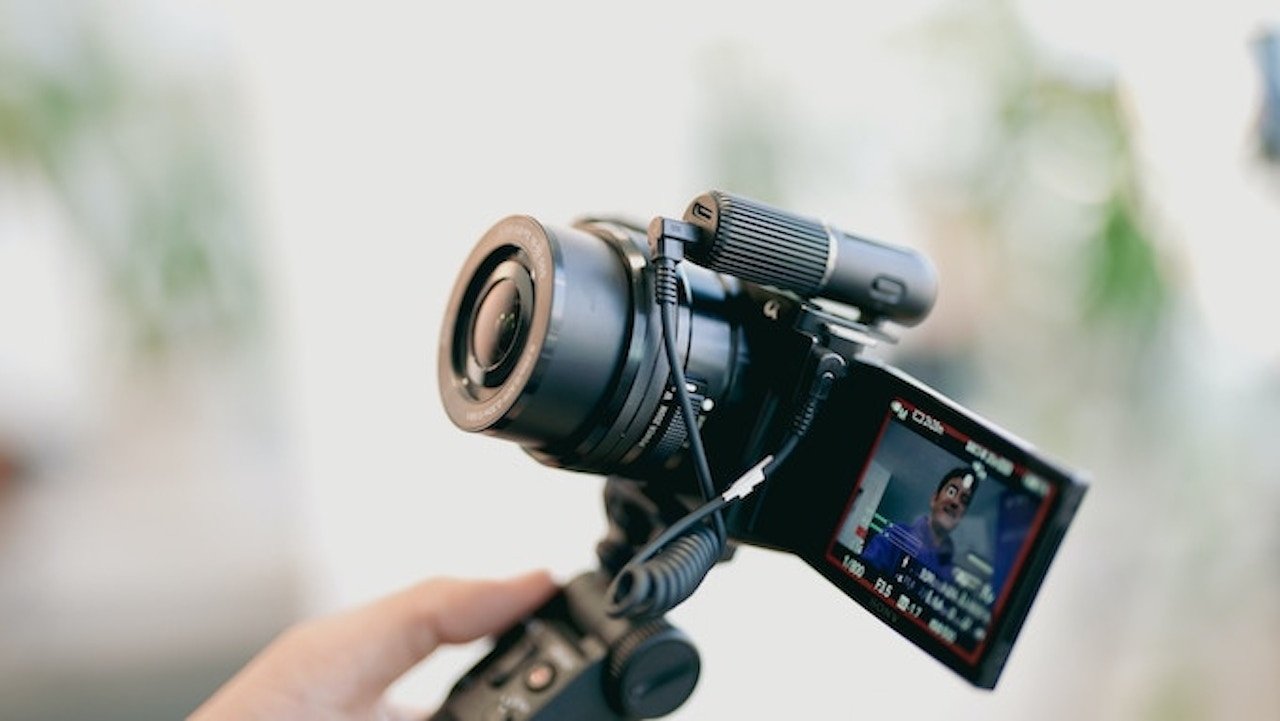
The clips on the mics and receivers fit perfectly into a DSLR's hot shoe.
Thronmax Space kit - Microphones
The condenser mics shine when you have someone speaking, but you also want some of the ambient environment sound-- for example, the echo of a church or the sounds of the beach. The lavaliers are best suited to an interview situation or when you want much less ambiance to be included with the voice.
Microphones this compact are, of course, no match for large-capsule USB or XLR mics such as Blue's Yeti, Rode's NT1, or Thronmax's array of desktop mics. But they do a good job of capturing voice with highs, lows, and midrange tones.
Even more importantly, the audio has no detectable "lag" that could cause sync issues with any recorded video. Our testing found this held true even when the subject was a considerable distance away.
These microphones have an impressive range when it comes to line-of-sight distances. We put them to the test in a 60-foot long, reverberant underground car park and different outdoor locations, such as by the ocean, while equipped with the provided windscreen. According to the manufacturer, these mics can maintain signal even at greater distances.
Indeed, we never once lost signal -- even when our back was turned, walking away from the receiver, or as far as 200 feet away.
Thronmax Space kit - Cords and hardware
One key factor to ensure a good-quality recording is learning the receiver module's minimalist controls. As with the transmitter mics, the on/off button is unmarked but pretty obvious, as it's set off away from other buttons.
We found that the transmitters and receivers paired instantly without fail -- no pairing required. That said, you can hold the power button on the transmitters to force pairing if necessary.
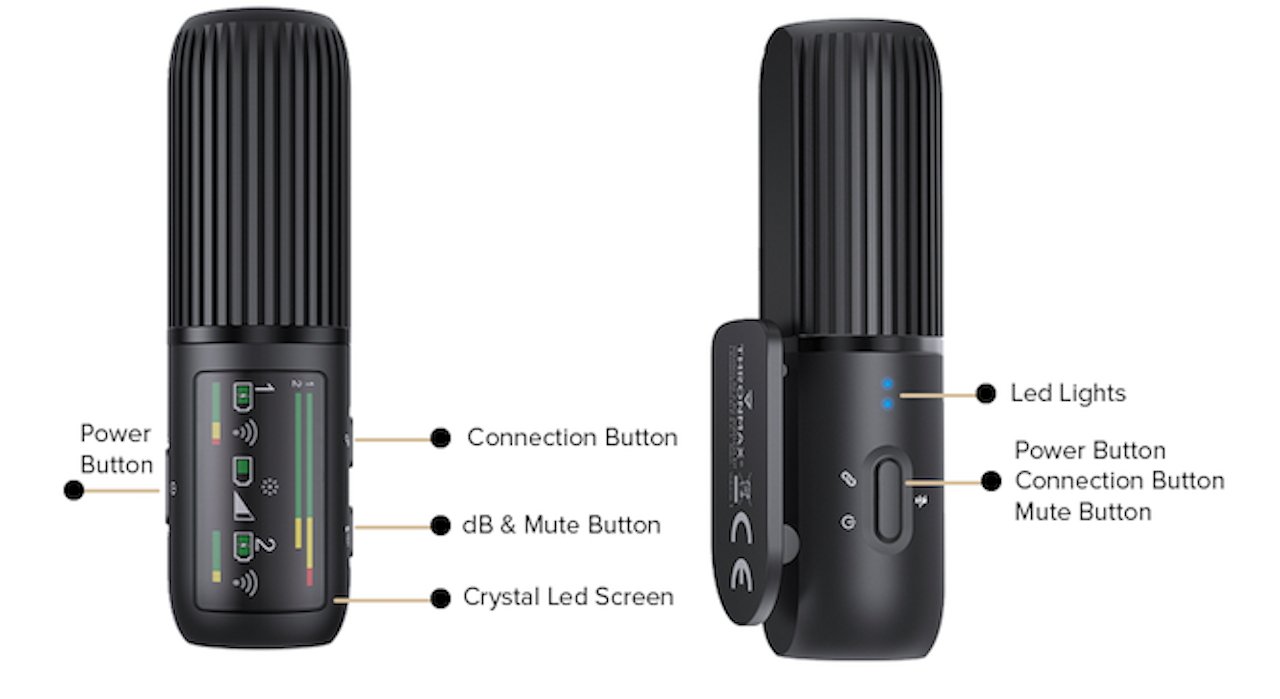
The receiver module also has a separate power button, an unmarked force-pairing button, and another unmarked button for adjusting the gain. Oddly, the gain is by default on full -- which will result in distorted audio if the mic is too close.
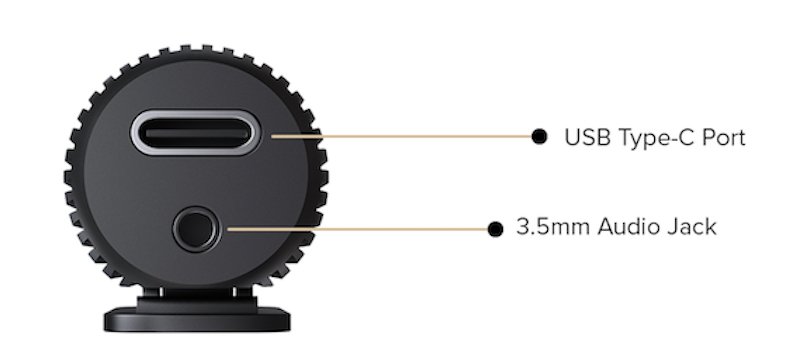
The underside of the condenser mics/transmitters. USB-C is for charging only.
In our testing, the two-thirds setting helped in noisy environments. The one-third setting was the norm for routine in-studio or quiet outdoor recording.
Once the gain is set, it is remembered until changed again. When the two mics are paired to make a stereo, they are perfect for recording nature sounds or live music.
The battery life on the mic/transmitters and receiver was also excellent, averaging about eight hours of "on" time. They can be quickly recharged using the tri-head USB-C cord to a USB-A port on a handy PC, older Mac, or battery pack.
If you don't have an available USB-A port because you're on location, you can use an adapter or hub to allow charging from a USB-C port. You shouldn't need to recharge on a typical location shoot, but it's best to have a battery pack to hand if you do.
The travel case makes for a tight fit to get everything in. However, it is wonderfully small and compartmented to make it easy to put everything in its place -- even the fuzzy, tiny windscreens.
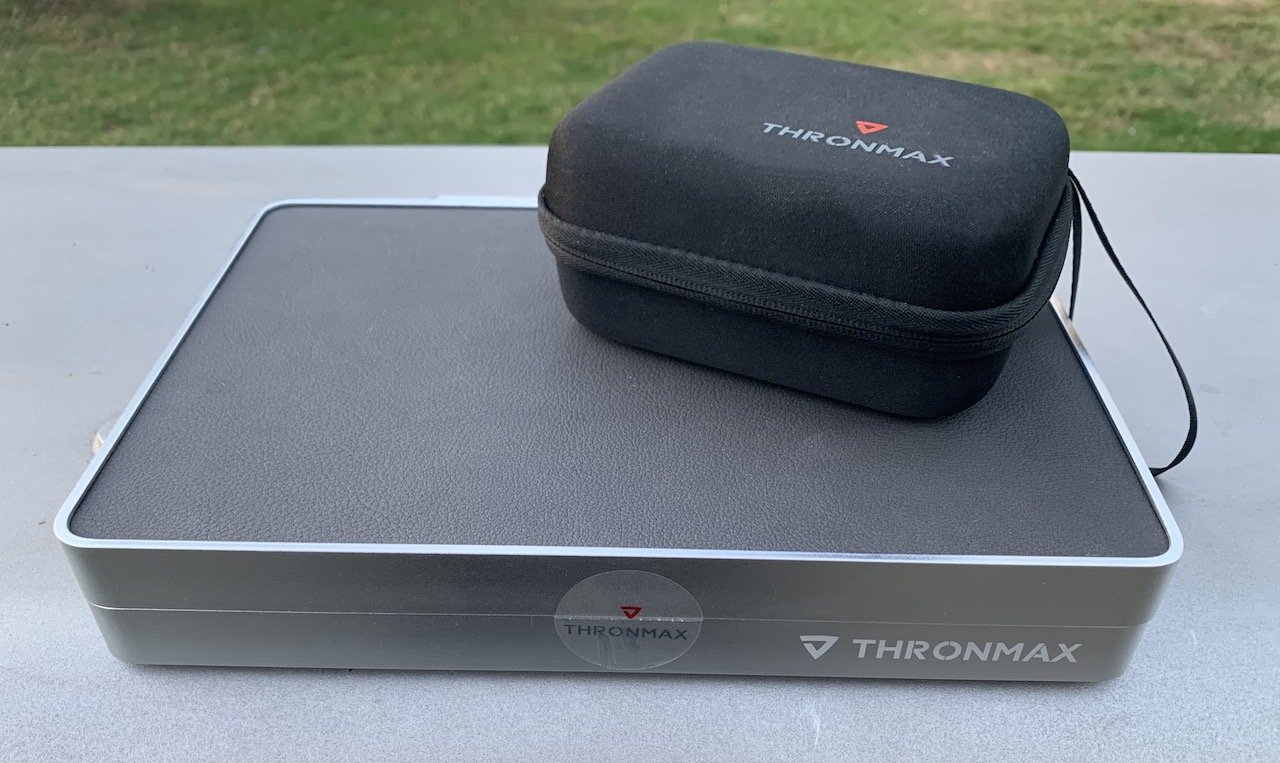
The presention box, and included (and far more practical) travel case.
The designers put a lot of thought into the presentation, and it shows. This is why we are somewhat confused that the company does not make any sort of recording software for mobile devices -- for any platform.
We used Rode's Connect app for mobile devices since it easily "sees" when an external mic is available. Macs can use Rogue Amoeba's excellent Audio Hijack.
Thronmax Space mic kit - Falls short of expectations
It's important to note that the version of the Space wireless mic kit we reviewed is pre-release. Thronmax may correct the software, cords, and full Apple compatibility issues by the time it appears on retail sites and in stores.
Given their decent track record with Macs for their desktop USB mics, we hope the final product will be more Apple-friendly. You are good to go if you're using an Android phone with a USB-C port for your recorder, apart from an actual recording app.
We have to review the product as we received it -- and the lack of included iOS/iPadOS cord compatibility stops this from being a four-star review. Thronmax should also develop its own smartphone recording app or partner with another company to provide an app.
Simply put, using this kit should not require ordering one or more Apple accessories. An Apple-compatible Lightning and USB-C to TRRS adapter should be in the box, even if that means making the travel pouch a tiny bit bigger.
The condenser mics themselves, and especially the combo mic-and-transmitter design, are very high-quality and well-designed. They have a sound on par with some of their competitors in this small wireless-mic space, such as the Rode One wireless system or the Saramonic version.
The included lavaliers, being smaller mics, are, of course, not quite as good. That said, they are well-suited to keeping ambient noise low and fine for any scenario where hiring a boom mic operator would be impractical.
Thronmax Space wireless mic kit - Pros
- Two mics and two types of mics included
- True stereo recording option
- Line-of-sight distance is impressive
- Rock-solid pairing and connection
- Good battery life, easy to recharge
- Unique, well-built design
Thronmax Space wireless mic kit - Cons
- No included iOS or iPadOS cables
- Extra Apple accessories needed for iPhone/iPad recording
- No accompanying recording app available
- Charging cord connects to USB-A
Rating: 3 out of 5
Where to buy the Thronmax Space wireless mic kit
This project was originally fully funded via Kickstarter and IndieGoGo. Afterwards, it became available to preorder from the Thronmax website, priced at $169.
Read on AppleInsider

Comments
More than that, it would have been nice to have a useful test of the sound quality. A statement like, "The included lavaliers, being smaller mics, are, of course, not quite as good" is a naive comment on the physics of sound and mics. I would rate the review 2 stars.